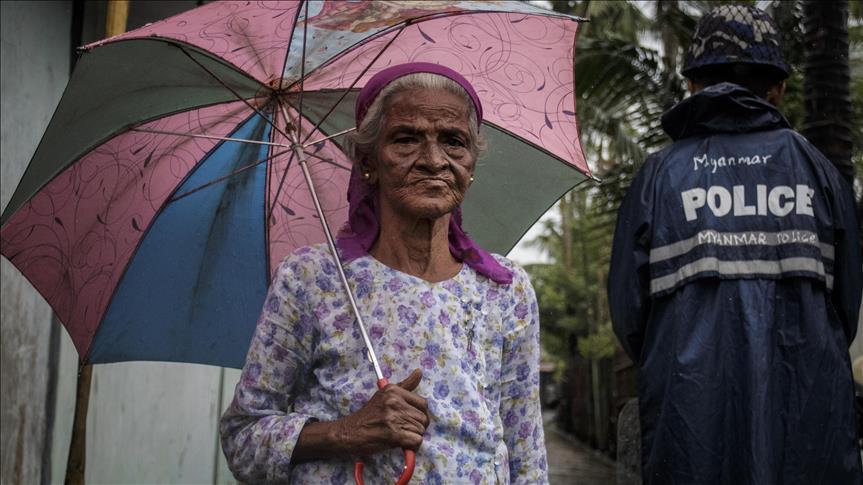Police claim those behind bloody raid not from Myanmar
Say attack carried out in Rakhine State by foreign nationals with help of locals to avenge religious building demolition
 Rohingya Muslims, who have been living in the temporary camps since communal violence in 2012, are seen at Aungmingalar quarter in Sittwe, capital of Myanmar's western Rakhine state, on September 7, 2016.
( Kyaw Kyaw - Anadolu Agency )
Rohingya Muslims, who have been living in the temporary camps since communal violence in 2012, are seen at Aungmingalar quarter in Sittwe, capital of Myanmar's western Rakhine state, on September 7, 2016.
( Kyaw Kyaw - Anadolu Agency )
By Kyaw Ye Lynn
YANGON, Myanmar
Police have said that two men captured during deadly police station raids in Myanmar's west are not from the Rakhine State community, but claim the attack was carried out with the help of locals to avenge the demolition of religious buildings.
At least 24 people -- nine police and 15 assailants -- died following attacks on three police station outposts Sunday in Maungdaw and Yathay Taung townships in Rakhine -- two areas predominantly occupied by the country's stateless Rohingya Muslim population.
On Tuesday, a senior police officer in state capital Sittwe underlined to Anadolu Agency by phone that the captured men were not from the area.
“They are neither Myanmar nationals nor local Bengalis,” said the man, using a word to describe Rohingya that suggests they are illegal migrants from Bangladesh.
He declined to comment, however, if they were Bangladesh citizens.
“It’s not the right time to disclose the country and organization they belong to,” said the officer, who asked not to be named as he did not have the authority to speak to media.
“They [the prisoners] said local Bengalis helped them as they are angry over government plans to demolish mosques in the areas.”
Last month, Rakhine regional government pledged to demolish more than 3,000 religious structures as part of a nationwide drive against illegal buildings, including 12 mosques and 35 madrasas (religious schools) built without permission in Maungdaw and Buthidaung townships.
Later Tuesday, the central government asked Bangladesh for help with the investigation.
In a Nay Pyi Taw meeting, Foreign Affairs Ministry Permanent Secretary Kyaw Zeya asked the Bangladesh ambassador to Myanmar Mohamed Sufiur Rhman for cooperation in border security and help capturing the culprits.
Since the early morning Sunday attacks, Rohingya advocacy groups have voiced concern at what they claim is a violent crackdown on the Muslim minority group.
"Mass arrests are taking place," a statement released late Monday headlined Stop Killing Innocent Rohingya in Arakan (the British colonial name for Rakhine) said.
It claimed that following the attacks more than 10 "innocent" Rohingya were killed by Myanmar military forces and police and many Rohingya women had also been arrested.
"In the past few hours seven Rohingya were shot dead by military forces in Myo Thugyi village in Maungdaw," the statement said.
Despite the arrest of the two militants, authorities are yet to confirm which group is responsible.
"We are not sure if the attackers are from the RSO, but they shouted the word 'Rohingya' during the raids,” Police Chief Zaw Win told a press conference Sunday, referring to the Rohingya Solidarity Organization (RSO).
The RSO is a shadowy outfit that takes its name from the Muslim minority group, which has been described by the United Nations as one of the world's most persecuted.
Though most experts believe the existence of the RSO is a myth, the government has classified it as a terrorist group and officials blame it for recent attacks on border areas.
Since the initial attack, an overnight curfew (7 p.m. - 6 a.m.) has been imposed, around 400 government schools temporarily closed, and all border trade gates and crossings with neighboring Bangladesh shuttered.
Maungdaw and Yathay Taungare are still governed by a partial curfew (11 p.m. - 4 a.m.) placed since communal violence between Rakhine Buddhists and Rohingya broke out in mid-2012 in which around 100 people are reported to have died.
Maungtaw District General Administrator Ye Naing told Anadolu Agency on Monday that the border gates would remain closed until at least the end of the week as government troops cleared the area.
On Tuesday, the European Union expressed sympathy to the families of those who lost their lives and called for the investigation to be conducted in line with the rule of law.
"In the meantime, we call on all parties to act responsibly, exercise restraint and let the investigation run its course," it said in a statement.
"The EU stands with Myanmar in these difficult moments."
Since mid-2012, Rakhine, one of the poorest regions in Myanmar, has been subject to incidents of communal violence between ethnic Rakhine Buddhists and Rohingya that have left nearly 100 dead and some 100,000 people displaced in camps.
On Oct. 3, Myanmar State Counselor Aung San Suu Kyi called on ASEAN member states for support in solving the “complex situation” in Rakhine, home to around 1.2 million Rohingya.
Since her party's victory in the Nov. 8 election, Suu Kyi has been placed under tremendous international pressure to solve problems faced by Rohingya but has had to play a careful balancing act for fear of upsetting the country's nationalists, many of whom have accused Muslims of trying to eradicate the country's Buddhist traditions.
Suu Kyi has, however, enforced the notion that the root of many of the impoverished region's problems are economic, and is encouraging investment in the area, which in turn the National League for Democracy hopes will lead to reconciliation between the Buddhist and Muslim communities.






